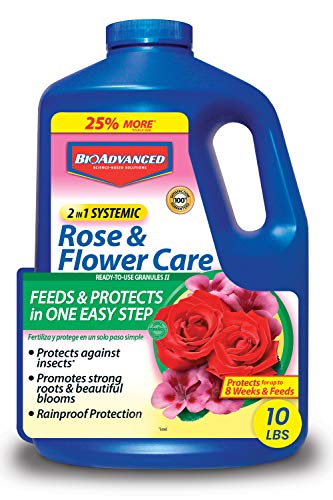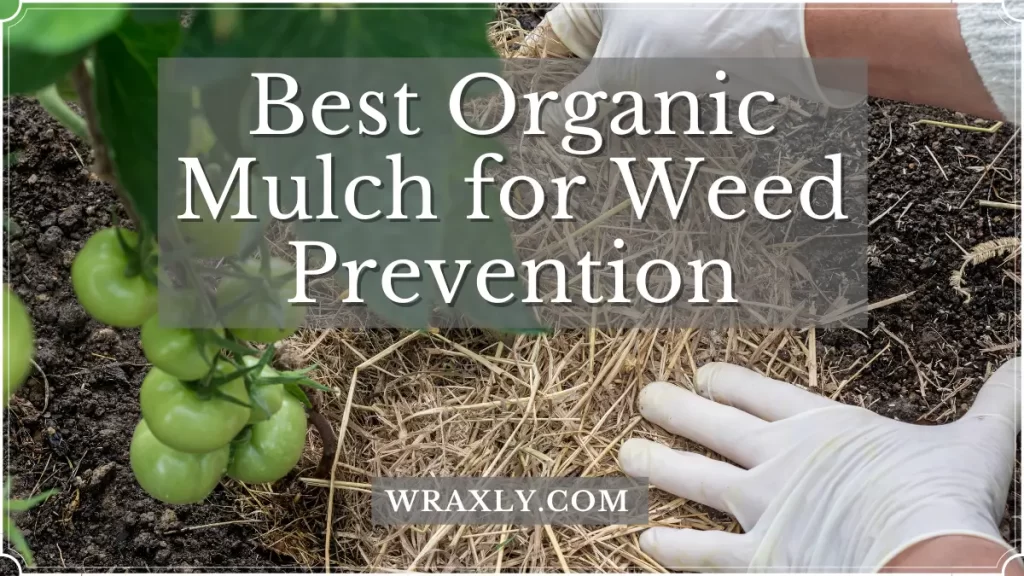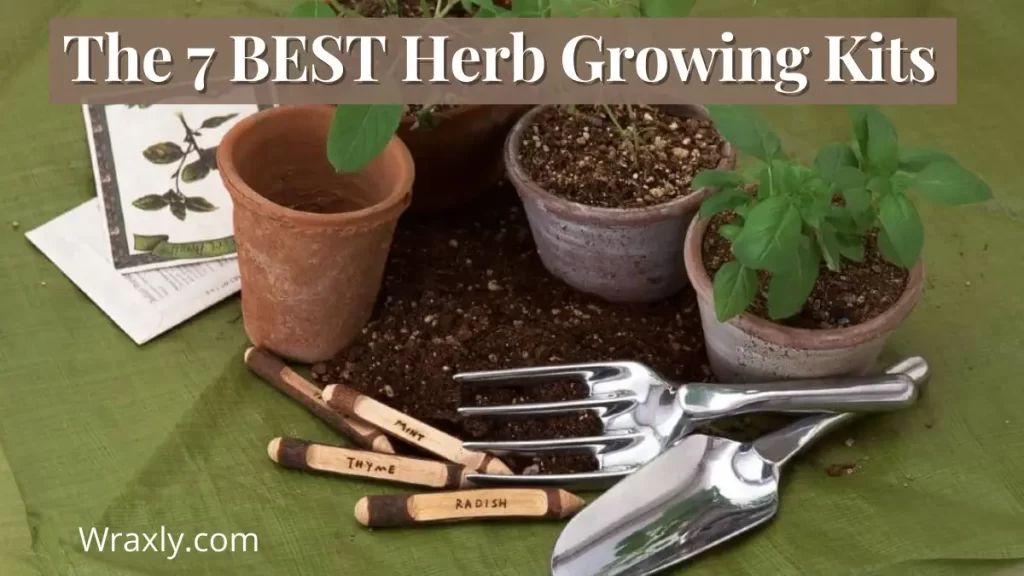Fertilization is one of the most important aspects of plant care. However, each plant you grow will have different preferences regarding the type of fertilizer they receive and when and how they receive it. In this article, we’ll cover the best fertilizer options for roses and give you some tips on how to give your roses fertilizer the proper way.
![7 Best Rose Fertilizers [Our Top Picks for 2022]](https://wraxly.com/wp-content/uploads/2022/04/7-Best-Rose-Fertilizers-Our-Top-Picks-for-2022.webp)
- Essential Nutrients for Rose Plants
- 7 Best Rose Fertilizers on the Market
- Natural Fertilizer Options for Roses
- When and How to Fertilize Roses
- FAQs about Fertilizing Roses
- Final Thoughts on the Best Fertilizer for Roses
Essential Nutrients for Rose Plants
Before we delve into the specific types of fertilizer you should use for your rose plants, let’s think about what fertilizer characteristics are most important for roses. As you’ll soon see, there are plenty of fertilizer options for roses. However, most of these fertilizers include a similar set of essential nutrients that are most suitable for rose plant growth. Here are the nutrients that are most crucial for these plants:
- Nitrogen: While not the most important macronutrient for roses, nitrogen plays a vital role in promoting the health of your plant’s foliage. When your rose receives too little nitrogen, you can expect to find leaf discoloration and poor overall growth.
- Phosphorus: The most valuable fertilizer nutrient for roses is phosphorus. Phosphorus encourages strong roots and will have a positive impact on the size and quality of the flowers your plant produces.
- Potassium: Although not the most critical for your rose’s health, your fertilizer should include a small amount of potassium. Potassium will help your rose recover from damage and contributes to the overall strength of your plant’s stems and buds.
- Micronutrients: Along with the three main macronutrients, your rose plant will grow best with plenty of micronutrients as well. Boron, calcium, chlorine, copper, iron, magnesium, and zinc are among the nutrients that roses will enjoy in smaller amounts.
General purposes fertilizers, which feature an even blend of nitrogen, phosphorus, and potassium, (also known as the npk ratio) may work well. However, following the nutrient guidelines in the list above will make for the best results.
7 Best Rose Fertilizers on the Market
Now that you have a firm understanding of what a rose fertilizer should include in a general sense, it is time to introduce you to a few of the best rose fertilizers you can purchase. Here are the top products in this category that we recommend:
- Down to Earth Organic Rose & Flower Fertilizer Mix
- BioAdvanced 2-in-1 Rose & Flower Care
- Miracle-Gro Water Soluble Rose Plant Food
- Jobe’s Rose Fertilizer Spikes
- Miracle-Gro Water Soluble Miracid Acid-Loving Plant Food
- Scotts Super Bloom Water Soluble Plant Food
- Element Nutrients Flower Fuel
Each of these products will work well to give your roses the best chance to thrive. But if you want to know what makes each one different from the others, read on to learn the details of each of these rose fertilizer options.
Down to Earth Organic Rose & Flower Fertilizer Mix
The Down to Earth Organic Rose & Flower Fertilizer Mix may work for nearly any flowering plant in your garden, but it is especially beneficial for roses. This five-pound bag contains an all-natural fertilizer blend that has plenty of phosphorus and about half as much nitrogen and potassium. This fertilizer also includes an impressive mix of secondary nutrients, including alfalfa meal and blood meal, both of which are especially helpful for roses.
- Down To Earth Rose & Flower Mix is a five pound box of all natural fertilizer with 4-8-4 formula and supplies nutrients for vigorous growth and sensational flowers
- A special fertilizer blend that provides ample nitrogen for vigorous growth, extra phosphorus for beautiful blooms and potassium and trace elements for healthy plant stock
- Great for starting edible bulbs, like garlic and onion, apply when planting your favorite new roses, bulbs, perennials and use throughout the season when new growth appears on existing plants
- Listed by the Organic Materials Review Institute (OMRI) for use in organic production and great to use on vegetable gardens, flower beds, containers and houseplants
- Ingredients: Fish Bone Meal, Langbeinite, Blood Meal, Alfalfa Meal, Seabird Guano, Rock Phosphate, Humates and Kelp Meal
- Down To Earth Rose & Flower Mix is a five pound box of all natural fertilizer with 4-8-4 formula and supplies nutrients for vigorous growth and sensational flowers
- A special fertilizer blend that provides ample nitrogen for vigorous growth, extra phosphorus for beautiful blooms and potassium and trace elements for healthy plant stock
- Great for starting edible bulbs, like garlic and onion, apply when planting your favorite new roses, bulbs, perennials and use throughout the season when new growth appears on existing plants
- Listed by the Organic Materials Review Institute (OMRI) for use in organic production and great to use on vegetable gardens, flower beds, containers and houseplants
- Ingredients: Fish Bone Meal, Langbeinite, Blood Meal, Alfalfa Meal, Seabird Guano, Rock Phosphate, Humates and Kelp Meal
- Down To Earth Rose & Flower Mix is a five pound box of all natural fertilizer with 4-8-4 formula and supplies nutrients for vigorous growth and sensational flowers
- A special fertilizer blend that provides ample nitrogen for vigorous growth, extra phosphorus for beautiful blooms and potassium and trace elements for healthy plant stock
- Great for starting edible bulbs, like garlic and onion, apply when planting your favorite new roses, bulbs, perennials and use throughout the season when new growth appears on existing plants
- Listed by the Organic Materials Review Institute (OMRI) for use in organic production and great to use on vegetable gardens, flower beds, containers and houseplants
- Ingredients: Fish Bone Meal, Langbeinite, Blood Meal, Alfalfa Meal, Seabird Guano, Rock Phosphate, Humates and Kelp M
Prices pulled from the Amazon Product Advertising API on:
Product prices and availability are accurate as of the date/time indicated and are subject to change. Any price and availability information displayed on [relevant Amazon Site(s), as applicable] at the time of purchase will apply to the purchase of this product.
BioAdvanced 2-in-1 Rose & Flower Care
Unlike many other rose fertilizers on the market, the BioAdvanced 2-in-1 Rose & Flower Care not only gives your plants the fuel they need, but this product also acts to eliminate some of the most pervasive garden pests, such as aphids, mealybugs, whiteflies, and more. Work this granular fertilizer into your topsoil, and soon you’ll enhance your roses’ growth while protecting them from infestations.
- PLANT FOOD: Feeds roses and flowers to promote strong and beautiful blooms
- 8 WEEK PROTECTION: Protects against listed insects in one easy step for 8 weeks
- INSECT KILLER: Kills Aphids, Japanese Beetles, Lace Bugs, Leafhoppers, Whiteflies, and other listed pests
- RAINPROOF PROTECTION: Systemic rainproof protection lasts up to 8 weeks
- COVERAGE AREA: Treats up to 80 rose bushes
- RESTRICTIONS: Not for use in CT, MD, & VT. Not for sale, sale into, distribution, and or use in Nassau, Suffolk, Kings and Queens counties of NY
- PLANT FOOD: Feeds roses and flowers to promote strong and beautiful blooms
- 8 WEEK PROTECTION: Protects against listed insects in one easy step for 8 weeks
- INSECT KILLER: Kills Aphids, Japanese Beetles, Lace Bugs, Leafhoppers, Whiteflies, and other listed pests
- RAINPROOF PROTECTION: Systemic rainproof protection lasts up to 8 weeks
- COVERAGE AREA: Treats up to 80 rose bushes
- RESTRICTIONS: Not for use in CT, MD, & VT. Not for sale, sale into, distribution, and or use in Nassau, Suffolk, Kings and Queens counties of NY
- PLANT FOOD: Feeds roses and flowers to promote strong and beautiful blooms
- 8 WEEK PROTECTION: Protects against listed insects in one easy step for 8 weeks
- INSECT KILLER: Kills Aphids, Japanese Beetles, Lace Bugs, Leafhoppers, Whiteflies, and other listed pests
- RAINPROOF PROTECTION: Systemic rainproof protection lasts up to 8 weeks
- COVERAGE AREA: Treats up to 80 rose bushes
- RESTRICTIONS: Not for use in CT, MD, & VT. Not for sale, sale into, distribution, and or use in Nassau, Suffolk, Kings and Queens counties of
Prices pulled from the Amazon Product Advertising API on:
Product prices and availability are accurate as of the date/time indicated and are subject to change. Any price and availability information displayed on [relevant Amazon Site(s), as applicable] at the time of purchase will apply to the purchase of this product.
Miracle-Gro Water Soluble Rose Plant Food
Since rose fertilizer is something you’ll be using quite often, it’s a good idea to find an affordable option. Thankfully, the Miracle-Gro Water Soluble Rose Plant Food performs just as well as any other top-of-the-line fertilizer and comes at an incredibly low price. This water-soluble fertilizer is easy to use and is guaranteed not to cause any fertilizer burn for your plants. For the best results, schedule your applications about once every two weeks.
- Instantly feeds to grow bigger, more beautiful roses versus unfed plants
- Feed every 1-2 weeks
- Endorsed by the American Rose Society
- Use with Miracle-Gro garden feeder or any watering can
- Guaranteed not to burn when used as directed
- Instantly feeds to grow bigger, more beautiful roses versus unfed plants
- Feed every 1-2 weeks
- Endorsed by the American Rose Society
- Use with Miracle-Gro garden feeder or any watering can
- Guaranteed not to burn when used as directed
- Instantly feeds to grow bigger, more beautiful roses versus unfed plants
- Feed every 1-2 weeks
- Endorsed by the American Rose Society
- Use with Miracle-Gro garden feeder or any watering can
- Guaranteed not to burn when used as direc
Prices pulled from the Amazon Product Advertising API on:
Product prices and availability are accurate as of the date/time indicated and are subject to change. Any price and availability information displayed on [relevant Amazon Site(s), as applicable] at the time of purchase will apply to the purchase of this product.
Jobe’s Rose Fertilizer Spikes
Jobe’s Rose Fertilizer Spikes offer you a convenient way to apply rose fertilizer. These spikes make it easy to apply your fertilizer, and the fertilizer within them comes premeasured, which takes away a lot of prep work compared to other fertilizer options. Each pack comes with ten spikes and should be enough to get you through a significant portion of the season.
- Pre-measured Rose Fertilizer Spikes nourish at the roots; time release fertilizer for all flowering shrubs
- Easy to use Rose Fertilizer Spikes; no measuring, no wasteful runoff, no mess, hazards or smells
- For best results apply early in spring & late summer when new growth begins for beautiful blooms
- Feeds for 8 weeks; continuous supply of nutrients below the surface, where the active roots are growing
- No dangerous runoff
- Pre-measured Rose Fertilizer Spikes nourish at the roots; time release fertilizer for all flowering shrubs
- Easy to use Rose Fertilizer Spikes; no measuring, no wasteful runoff, no mess, hazards or smells
- For best results apply early in spring & late summer when new growth begins for beautiful blooms
- Feeds for 8 weeks; continuous supply of nutrients below the surface, where the active roots are growing
- No dangerous runoff
- Pre-measured Rose Fertilizer Spikes nourish at the roots; time release fertilizer for all flowering shrubs
- Easy to use Rose Fertilizer Spikes; no measuring, no wasteful runoff, no mess, hazards or smells
- For best results apply early in spring & late summer when new growth begins for beautiful blooms
- Feeds for 8 weeks; continuous supply of nutrients below the surface, where the active roots are growing
- No dangerous run
Prices pulled from the Amazon Product Advertising API on:
Product prices and availability are accurate as of the date/time indicated and are subject to change. Any price and availability information displayed on [relevant Amazon Site(s), as applicable] at the time of purchase will apply to the purchase of this product.
Miracle-Gro Water Soluble Miracid Acid-Loving Plant Food
With three convenient sizing options, the Miracle-Gro Water Soluble Miracid Acid-Loving Plant Food is another fantastic water-soluble fertilizer that will lead to amazing blooms on your rose plants. This mix works immediately after application, and you should repeat applications about once per week for the best results. This product is also ideal for other acid-loving flowering plants like azaleas, camelia, and more.
FURTHER READING
- 10 Beginner Tips for Flower Garden Design
- The Best Method for Growing Roses Indoors
- How Long Can Roses Go Without Water
- 10 Ways to Keep Cut Roses Fresh in Water
Scotts Super Bloom Water Soluble Plant Food
With this fertilizer option, the term “super bloom” is not at all misleading. In fact, the Scotts Super Bloom Water Soluble Plant Food has a higher ratio of phosphorus, which is responsible for vigorous blooms, than any other fertilizer on this list. Mix just two teaspoons into a gallon of water, and soon you’ll be ready to feed nearly any flower in your garden, roses included.
- Contains high phosphorus to help plants bloom
- Feed every 1-2 weeks for best results
- Water-soluble plant food feeds plants instantly
- For outdoor flowers, fruiting plants, containers and bed areas
- Wont burn your plants when used as directed
- Contains high phosphorus to help plants bloom
- Feed every 1-2 weeks for best results
- Water-soluble plant food feeds plants instantly
- For outdoor flowers, fruiting plants, containers and bed areas
- Wont burn your plants when used as directed
- Contains high phosphorus to help plants bloom
- Feed every 1-2 weeks for best results
- Water-soluble plant food feeds plants instantly
- For outdoor flowers, fruiting plants, containers and bed areas
- Wont burn your plants when used as direc
Prices pulled from the Amazon Product Advertising API on:
Product prices and availability are accurate as of the date/time indicated and are subject to change. Any price and availability information displayed on [relevant Amazon Site(s), as applicable] at the time of purchase will apply to the purchase of this product.
Element Nutrients Flower Fuel
The Element Nutrients Flower Fuel includes a blend of nutrients, hormones, amino acids, and more, specifically formulated to support the healthiest growth in your rose plants. Like some of the other leading fertilizers on the market, this one features a high ratio of phosphorus to promote better blooms. The Element Nutrients Flower Fuel is also incredibly potent. Just a quarter of a teaspoon is enough for an entire gallon of water.
- Flower Fuel is a super-premium bloom booster. Consists of nutrients, amino acids, vitamins, and organics.
- Formulated to achieve larger, denser and heavier harvests with more essential oil and resin content. That means better looking, more valuable crops for you.
- Over 40 proprietary ingredients go into every jar of Flower Fuel. Among these are powerful nutrients, vitamins, hormones, amino acids, essential organic components, and every single micro and trace element you need to get your best harvests yet.
- Flower Fuel is a 100% hydroponic-grade, soluble bloom fertilizer. It works great with any base nutrient (including all popular 2 and 3-part nutrients), and in any soil, coco, hydroponic or aeroponic system.
- TREATS 200 GALLONS OF WATER! Try Flower Fuel Today for Bigger, Better Harvests!
- Flower Fuel is a super-premium bloom booster. Consists of nutrients, amino acids, vitamins, and organics.
- Formulated to achieve larger, denser and heavier harvests with more essential oil and resin content. That means better looking, more valuable crops for you.
- Over 40 proprietary ingredients go into every jar of Flower Fuel. Among these are powerful nutrients, vitamins, hormones, amino acids, essential organic components, and every single micro and trace element you need to get your best harvests yet.
- Flower Fuel is a 100% hydroponic-grade, soluble bloom fertilizer. It works great with any base nutrient (including all popular 2 and 3-part nutrients), and in any soil, coco, hydroponic or aeroponic system.
- TREATS 200 GALLONS OF WATER! Try Flower Fuel Today for Bigger, Better Harvests!
- Flower Fuel is a super-premium bloom booster. Consists of nutrients, amino acids, vitamins, and organics.
- Formulated to achieve larger, denser and heavier harvests with more essential oil and resin content. That means better looking, more valuable crops for you.
- Over 40 proprietary ingredients go into every jar of Flower Fuel. Among these are powerful nutrients, vitamins, hormones, amino acids, essential organic components, and every single micro and trace element you need to get your best harvests yet.
- Flower Fuel is a 100% hydroponic-grade, soluble bloom fertilizer. It works great with any base nutrient (including all popular 2 and 3-part nutrients), and in any soil, coco, hydroponic or aeroponic system.
- TREATS 200 GALLONS OF WATER! Try Flower Fuel Today for Bigger, Better Harves
Prices pulled from the Amazon Product Advertising API on:
Product prices and availability are accurate as of the date/time indicated and are subject to change. Any price and availability information displayed on [relevant Amazon Site(s), as applicable] at the time of purchase will apply to the purchase of this product.
Natural Fertilizer Options for Roses
Many gardeners opt for store-bought or synthetic fertilizer to meet their rose-feeding needs. However, there are plenty of other fertilizer options you can use. In the sections below, we’ll reveal a few organic materials that will support your rose plants more than you might expect.
Bone Meal for Roses
Bone meal is one of the most popular natural fertilizer options for your rose plants. Made from the crushed bones of deceased animals, bone meal proves to be high in phosphorus, which, as you know by now, encourages healthy flowering. Sprinkle some bone meal around your rose plants during planting or just before the flowering season.
You may also be interested in… Best tomato fertilizer for containers
Alfalfa Meal for Roses
Alfalfa meal is an excellent natural fertilizer when the soil in which your roses grow has become deficient in nitrogen. While nitrogen is not the most important nutrient for roses, it remains a vital element for healthy rose growth. An application of alfalfa meal will restore suitable nitrogen levels in the soil and help your rose put forth lush foliage.
Manure for Roses
Manure is well known to improve soil quality for many garden plants, and roses are no exception. Adding some organically rich manure to your garden beds each year will boost the number of nutrients in your soil and ensure that your roses have plenty of fuel to continue their growth throughout the entire season.
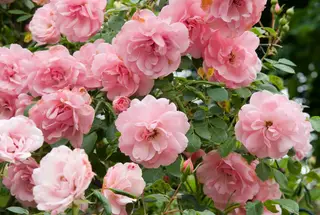
Compost for Roses
Much like manure, compost will also supply your roses with ample amounts of organic nutrients. Compost may also improve the structure of the soil where your roses grow. As you should know, roses love to have excellent drainage. An amendment that includes compost will ensure that your soil is loose enough to allow water to drain freely while holding the correct amount of moisture for your rose roots.
Coffee Grounds for Roses
Another crafty way to improve your rose soil in a natural way is to sprinkle coffee grounds in the area around your rose. Coffee grounds can help elevate nitrogen levels if that is an issue in your growing location. They may also help to reduce the overall pH of your soil, creating a more acidic environment in which your roses will thrive.
Banana Peels for Roses
Another natural source of soil nutrients for roses is banana peels. Banana peels contain plenty of phosphorus that will break down into the soil and nourish your rose’s blooming ability. To apply this treatment, you should chop your banana peels into tiny pieces. Then, scatter the pieces throughout your garden beds and work them into the first few layers of soil. Soon, the banana peels will decompose and give your roses the nutrients they need to produce their best flowers.
When and How to Fertilize Roses
Knowing the nutrients that a rose needs and where to find them are not enough to keep your roses in the best condition. For that outcome, you need to know how and when to apply fertilizer to your roses, which the following sections will show you how to do.
What is the Best Time of Year to Fertilize Roses?
Most rose plants are heavy feeders, meaning that you’ll need to apply fertilizer multiple times throughout the growing season. You’ll also want to amend the soil periodically as well to improve the overall characteristics and structure.
Begin each season by applying fertilizer to the ground near your roses in the early spring. After your roses have bloomed, fertilize them again. Throughout the rest of the season, you can continue fertilizing about once every week or two.
Although this approach calls for a lot of fertilization compared to what you would supply to other plants, this high volume is worth it. The main reason to grow roses is to produce large and colorful blooms. Frequent fertilization is one of the keys to ensuring those beautiful blooms appear in the greatest quantities and with the best appearance.
How Should You Fertilize Roses?
Timing your rose fertilization is of the utmost importance, and so is the way you supply that fertilization. In many cases, rose fertilizer mixes are water-soluble, which means you should dilute them in water before applying them to your soil.
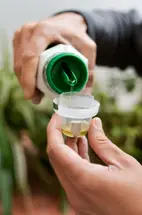
When working with a water-soluble rose fertilizer or liquid fertilizer, you should follow the manufacturer’s instructions that will guide you through how much fertilizer to mix with how much water. But while these guidelines are helpful, some gardeners believe in being a bit more flexible with how much you dilute your water-soluble fertilizer.
Many people suggest that you should provide lower concentrations of fertilizer as the season passes. In other words, your early-season fertilizations should be the strongest, while those that take place later in the year can be a bit more diluted.
Beyond water-soluble fertilizers, there are plenty of other options for feeding roses. Granular and powder-based fertilizers can work well, too, and come with their own application instructions. What’s most important is ensuring that the rose fertilizer you use has all the essential nutrients a rose plant needs, regardless of the specific form your fertilizer comes in.
FAQs about Fertilizing Roses
Fertilizing roses the proper way is a gardening topic worth considering. As such, many gardeners have a few questions about how to get the job done right. Here are some answers to some of the most popular ones.
What Are the Benefits of Fertilizing Roses?
The benefits of fertilizing roses are numerous, and if you wish to get the most out of your rose shrubs, then you should be well familiar with what those benefits are. Here are the main positive outcomes you’ll see in your rose plants if you fertilize them the right way:
- More vibrant blooms: With the right type of fertilizer applied at the right times of the year, each individual flower on your rose bush should be bolder, showing a deeper and more eye-catching color.
- More blooms overall: The blooms of your rose shrub will not only be better with the right fertilization. The blooms should also arrive in larger quantities each year.
- Longer-lasting blooms: Some roses can be quick to fade and fall from the plant. However, those that experience the right fertilization schedule will likely hold their blooms for longer.
- Stronger overall growth: Fertilizer does not just help flowering characteristics. The right fertilizer will also support strong overall growth for the roots, stems, and buds of your plant.
- Better disease resistance: Proper fertilization will make your rose bushes more resilient overall. When they face diseases or weather damage, they will be much better prepared to withstand those challenges.
As you can now see, fertilization helps your roses in more ways than one. Whether you hope to develop the best rose flowers on your plant or support healthy overall growth, fertilization is a must.
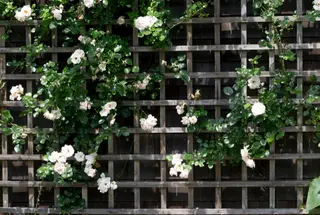
What Happens if You Don’t Fertilize Your Roses?
If you don’t fertilize your rose plants at the right time, in the right amount, and with the correct fertilizer mix, you risk several negative outcomes. A poorly fertilized rose plant will fail to exhibit the most impressive versions of its flowers. It may also show a weak overall growth habit, too many leaves, or an inability to react to and overcome diseases.
Can You Fertilize Your Roses Too Much?
In most cases, more fertilizer is better for roses. With that being true, there remains a possibility that you can overfertilize your rose plants. Giving too much fertilizer will lead to growth that is both fast and weak. It may also reduce flower buds or lead to excessive production of foliage that may block whatever buds do develop.
Often, it is an excess of nitrogen in the soil that leads to these problems. In extreme cases, your rose plant may experience fertilizer burn. When fertilizer burn occurs, the roots will receive damage, and the leaves may begin to show discoloration.
When Should You Stop Fertilizing Your Roses?
Roses need a relatively high amount of fertilizer compared to other plants. However, there is a distinct time of year that you should stop fertilizing your rose plants every year. Generally, it is best to apply your last dose of rose fertilizer in the later summer or early fall, several weeks before the first seasonal frost arrives.
When Should You Begin Fertilizing Roses Each Year?
After ceasing fertilization throughout the end of fall and through most of the winter, you can restart your fertilization routine in the late winter or early spring. At times, initial fertilization in February is ideal for promoting the best blooms in spring. Early fertilization also gets your rose’s new growth off to a good start for the new growing season. Once you begin fertilization, you can continue doing so about every one to two weeks.
Final Thoughts on the Best Fertilizer for Roses
Growing healthy rose plants can seem like a challenging task to some. But if you know how to care for these plants, you should have no problem keeping yours alive and looking excellent. Proper fertilization will be a core element in how well your roses perform and using the tips outlined above will help you give your roses the soil characteristics that they prefer most.

John Haryasz is a freelance writer and landscape designer. In the field of landscape architecture, he has contributed to many successful design projects throughout the country. As a writer, John specializes in creating captivating and informative web content. Through that work, he aims to share his design knowledge and promote engagement with the outdoor world.

